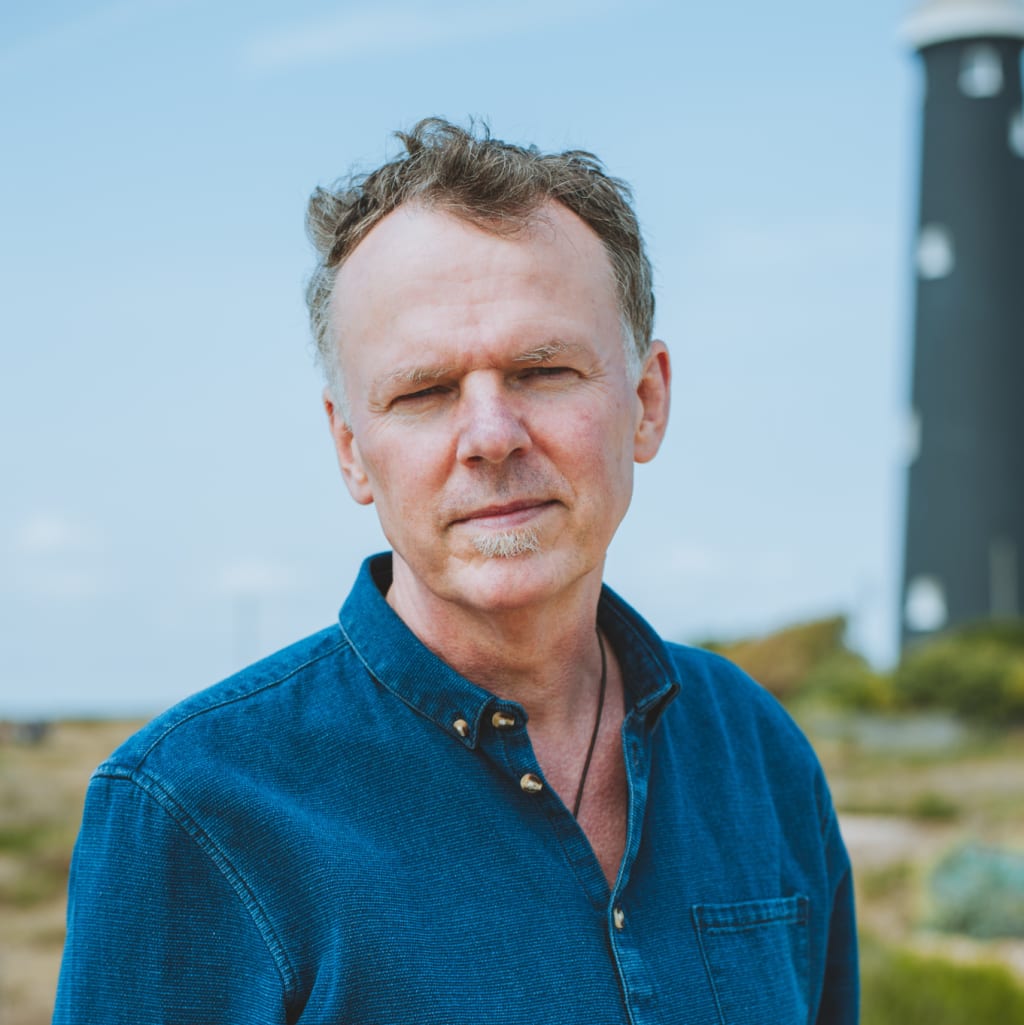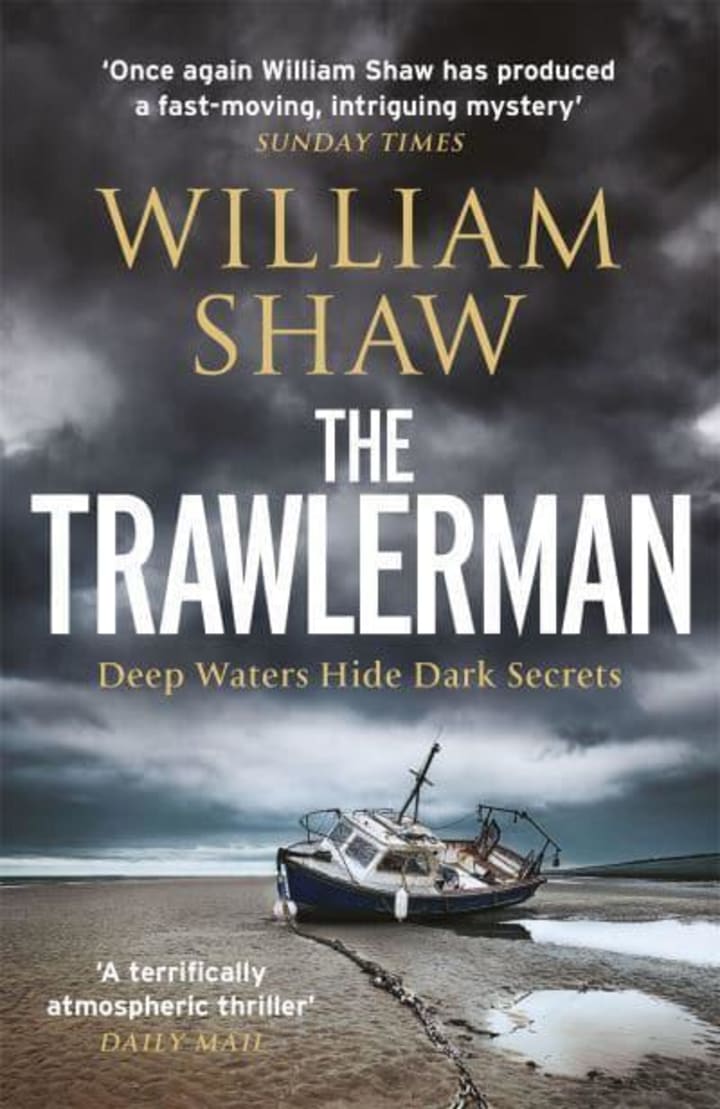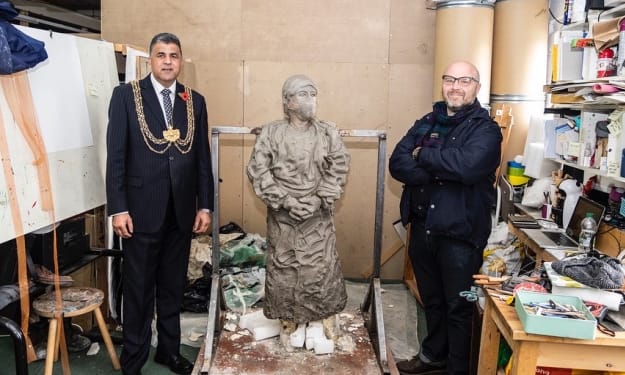William Shaw On A Life In Crime
It took 30 years and three failed novels, but he's now one of the stars of British crime fiction. Here's how he writes.

When I talk to crime novelist William Shaw, he is alone in his writing shack in Devon, on the English coast. It's an off-grid, wooden building close to the sea but even closer to railway tracks, which is why he bought it so cheaply 30 years ago. "It was going for virtually nothing, because Network Rail have the rights to demolish it with no notice," he explains. "That put people off!"
It's a good place to go work on a book, especially when he gets to the messy middle. "I can go a bit bonkers here. I always end up with a bit of a mess in my books. It gives me the chance to completely go around muttering to myself, which is quite useful. Otherwise, you're just in a bad mood with everybody else around you."
He realised how useful this can be with his 2016 book The Birdwatcher, a crime thriller set in the bleakly beautiful coastal landscape around Dungeness in Kent.
"I'd written all the elements of it, but I still didn't know what it was. I spent a fortnight down here, just putting Post-It notes all around the shack and suddenly, I thought, 'Oh, this is all one thing. It fits together!' The thematic stuff that made sense of it all emerged."
"In some ways, I'm always chasing that. It always feels like I'm completely lost and in the dark. But now I know I've done it before. And if I put the hours in, I will produce something. So I've slogged away with this new book, and it's now kind of forming more of a whole. Although it's not turned into something miraculous yet!"
A former journalist, he wrote one of my favourite books about music. Westsiders came out in 2001 and follows the fortunes of seven Los Angelinos trying to make it in the rap business. But it's in crime fiction that he found his audience, and the success his writing deserves.
He now lives most of the year in Brighton, on the English coast, and the coastal landscape of Sussex and Kent features heavily in his most successful crime series, featuring DI Alex Cupidi and her surly teenage daughter, Zoe. The latest, The Trawlerman, had just come out in paperback when we talked, and he has a stand-alone thriller, Dead Rich, coming out in May 2022 under the name GW Shaw.

A book a year sounds relentless. Does it get its own rhythm?
It does. I'm friends with a crime writer called Elly Griffiths, and she does up to three books a year. And she says – very wisely – that a book actually takes you the time it takes to write it.
If you've only got nine months to write a book, you will write a book in nine months. If you've got three months to write a book, you will write a book in three months. Georges Simenon wrote them in a fortnight!
Tell me about your journey from journalism into fiction.
All the time I was hanging out with my journalist friends, I was also writing bits of fiction. I wrote a novel in the 80s. I had children in the 90s, so that slowed me down a bit. Then I wrote two more in the noughties, none of which will ever see the light of day.
I had a really successful agent at the time, and he encouraged me. But in the end he said, 'Look, William, I really like your writing. But stick to the non-fiction.' And I was crushed, because that was 20 years of work. So I stopped for a year.
But when you talk a lot to people who write fiction, they can't give it up. Some people just feel compelled. So I started writing that first [crime] book. I knew from about 10 pages in that I'd suddenly figured out what I was supposed to do. But it took me almost 30 years to get there. That's not uncommon. I always get incredibly jealous when some perfectly formed writer comes out the bag at 23!
If you're honest with yourself - and I think most writers are, because that's what writing is about - you recognise when you've actually done it. I kind of knew those first three novels weren't proper novels. The first one was a complete mess. The second one was alright; I've read some published fiction that's just as bad. But it wasn't good. And the third one was terrible. So it took me three novels to learn how to write a novel.
So what's your routine now?
I'm on my 11th novel now, and I'm just as chaotic as when I started. When I get really convinced by an idea, I noodle around with it. And the idea can be absolutely anything at all.
With Dead Rich, it was thinking about the yachtswoman Helen MacArthur. What if you weren't her? What if you're the person who didn't make it, who put their whole life into trying to do that solo round the world thing, and you didn't get on the ladder? And I wanted to write a nautical book, about technology versus nature.
It's an old-fashioned type of book, where you are at sea and technology starts to fail. And the only thing that's going to win is understanding the basic low-level science of how boats work. I carried that idea around for a couple of years. Then suddenly I started writing, and it turned into this thriller.
It tends to be like an idea like that, where you've got some little kernel of truth. For my book Salt Lane, I wanted to write about Romney Marsh [a stretch of salt marsh, on the Kent coast]. It's the most extraordinary landscape, and for well over 1000 years, we've been trying to keep water out. At the same time, the politics of Kent was about keeping people out and I just thought I could use landscape and nature to talk about the labour market and migration and things like that.
Everybody's different, but for me it's nice to have some sort of thematic landscape in which you're going to land the novel. Which sounds very pretentious for crime writer, but it seems to be what I like to do.
You don't tend to kill many people. There aren't piles of bodies in your books, yet they're very tense.
That's what I'm wrestling with now! I'm looking at the novel I'm doing now, and I haven't killed enough people. That's the revelation I had yesterday: I've got to think of a few more grisly action scenes.
But a lot of readers don't necessarily want serial killers. I do kill two or three, generally. And in the thriller that's about to come out, it's carnage! About halfway through, I needed to thin the cast down significantly.
But really, my aim is to make people care enough about one murder. In the early crime fiction days, they'd only kill one person. I think we've ramped it up. What you're really trying to do make the reader believe that this person could die. Because violent death, in our society, is rare. But we've got to make you believe in it. If you can only do that by ramping up the body count, then I think you're not being deft enough.
Although, there are some great serial killer novelists. I've been reading MW Craven, and he always kills three or four people as a bare minimum, if not more. So nothing against it. But I quite like the idea of trying to make people really, really care about the one death.
Is there a correlation between the violence in your books and how pleasant crime writers tend to be?
They're very good collegiate bunch of people. There's a body of thought that thinks that we get all our badness out. But to be any kind of writer, you have to be fairly empathetic. Because that's a big tool in your toolbox. You've got to be empathetic with a reader you haven't even met.
We're also working in a successful genre. That does help! It would be tough to be a very committed literary fiction writer at the moment. It's feasible to be a full-time crime writer without teaching, or anything like that. If you write literary fiction, you often need something else as your major source of income.
Tell me about your support network.
It's a team job, really, writing a book with just your name on it. Some people have started giving credits in the back of their books, almost like films: production editors and stuff like that. Which seems honest. So I have a great editor and a phenomenal agent.
My partner Jane absorbs a great deal of me talking about plot points. What if they did that? Is that plausible? And she's always been clever enough to know that actually, it's about just putting a bit of an arm around me and letting me talk. A lot of the process of writing is very indulgent. You go a bit bonkers.
I give very few people my manuscripts now. There are various people in Brighton who I work with. I was in a writers' group with CJ Sansom, before he published his first book. He's a very successful historical fiction writer, and I give him and a couple of others bits to read, fairly early on.
I do think the writers' group is essential. The one thing I'd say to writers is to just get over that embarrassment about calling yourself a writer and go meet other writers. Being a writer just means you write. It doesn't mean that you've got 10 books successfully published. So go and find those people and share your experience with them, read each other's work and comment on it. It's incredibly useful.
What tools do you use?
I find Scrivener really useful. Not that I think it's very well designed. But it's got enough of the bits that go in the right place. And it's got a very good way of backing up.
As a journalist, I used to like writing the story on the plane home. So I always went for low-voltage devices like Psions, because back in the day, you'd be lucky if a real laptop lasted more than two hours. And you need five maybe to get your transcription done. So I'd be tapping on these tiny little devices.
I'm a big believer in having something with you all the time that you can write on. I can take notes in longhand, but I need to write with my fingers. Creation happens at the point of the fingertip as much as in the brain. So I carry an iPad with me, with a little keyboard. And it can always backup to the cloud.
Backing up is obviously something we've all learned about. The novelist's worst nightmare is losing stuff! Touching wood, I haven't lost more than a couple of chapters, in the last 10 years or so.
What do you do when you're stuck or uninspired?
My main thing is to write harder. It's a bit hair shirt, but if you feel like nothing's happening, that's kind of your fault. You just need to write more words. Because even if they're complete gibberish, something might happen.
It's interesting, where ideas come from. For me, they do come from writing. If you don't know what happens next, just write some old nonsense, and then cut it down to the one sentence that is interesting. You can waste days on that, but quite often you'll also get quite a good idea. Rather than just saying you have writer's block. It sounds very uncaring, because people do get that. But my own sort of Presbyterian attitude is just go for it and make stuff. And be the judge of whether it's any good later.
But also, a lot of the thoughts come to you when you sit down after you've done something else. This is why I'm writing in this off-grid shack at the moment. You have to chop the wood for the burner, purify water, do the composting toilet, the laundry. They're all low-level manual activities that take very little thought.

But after doing something like that for an hour, quite often something else has occurred to you while you weren't thinking. Because the brain does weird things. It's why writing in concentrated bursts really works. If you put all the elements in your brain, then do something else, quite often it comes up with something that you're not conscious of thinking of. You learn to respect it, to let it do its thing, and not panic. Because it will do its thing, if you care enough about what you're writing.
The other thing is to go for a walk. That's quite useful. There's a lot of writing about how walking produces thought. Walking and thinking are actually the same thing, to certain extent. And I'm totally up for that. Because I'm also incapable of concentrating on anything for very long anyway.
If I do two hours concentrated work, that's a huge win. Quite often, I can do a lot less than that. I get up, wander out, do something else, look at my tweets, and that's just the way I am. I've stopped feeling guilty about it. Because I still written 15 books, nonfiction and fiction. So I'm obviously doing some work. But often it doesn't feel like work. So just don't beat yourself up about it. So long as you're doing something, moving forwards.
We all do it differently.
The brain is an extraordinary thing. Not only do we all write books completely differently, we all read books differently. Our brains approach things in different ways. I realised that I have this thing called aphantasia: I don't have a mind's eye. I always thought it was a metaphor. When people say, 'I see this in my mind's eye,' I thought, 'No, you don't!' Because I don't see anything when I close my eyes and imagine things. And I didn't realise that other people did.
Everybody says I have an interesting, sparse form of description, and maybe it's related to the fact that neurologically I'm a bit different. We all have various little kinks in our neurology because the extraordinary way in which we learn and put our brains together. We're all wired slightly differently, and some people have some sort of dysfunction that they've managed to turn into advantage.
Yet landscape is such a key part of your books.
And people say, 'Oh, you describe it so well.' Go and look: if you could condense the amount of landscape description in all of my books, you would barely get a chapter out of them. I can see things and I can remember them, and I know what they smell like. But they're precious. Find the precious bits, use those and let the reader do what I think I do, which then fill the gaps.
So if you want to get readers on Dungeness [the shingle expanse where DI Cupidi lives], you just talk about something like the wind, or the colour of the vegetation there, or the sound of walking on shingle. And let them do all the rest of the work. Because that puts them there. And then they become convinced you've done this fantastic description of the place.
That's interesting, because I see your descriptions as vivid. I'll have to read back over them now!
(laughs) I'm making you do all the work! And that came from journalism too, because you've got to be economical with words and you're trying to put readers in somebody's front room. So you pick out a couple of details that are true. That's useful in crime fiction, which is all about economy.
Tell me about The Trawlerman.
The initial idea came from talking to a woman who runs a fish smokery in Brighton. She told me that her first husband got lost at sea. He was a trawlerman, and they never found his body. She was in love with another man at the time, but she couldn't marry him for seven years. Because you can't declare somebody dead without a body.
I sat on that story for a long time, then wrote it mostly under lockdown. Then I got a trawlerman to take me out, a guy called Luke, in Folkestone. I told him I was writing about somebody dying on a boat, and what happens when they get lost overboard, and their body's not found. And he said, 'That's what happened to my granddad.'
It's a brutal industry. There are no safety devices. He didn't have a harness. He didn't wear a life jacket. [The sea] was quite flat when I went out with him, but you're standing on top of fish, and they're quite slippery and they move. And the edges of trawlers are not high because you need to haul things over them all the time.
His wife would wake up in the night and look at his trace on the GPS. And if he was going in a straight line, she'd either call him up, or she'd call the Coast Guard. So every every half mile or so, he'd turn the wheel a little bit, just to show her that he was still with the boat.

This article contains affiliate links. If you have a good local bookshop, however, please support it if you can!
About the Creator
Sheryl Garratt
Sheryl Garratt is a former editor of The Face and Observer magazines, and has written professionally for more than 30 years. She is also a coach working with creatives of all kinds. Find her at thecreativelife.net







Comments
There are no comments for this story
Be the first to respond and start the conversation.